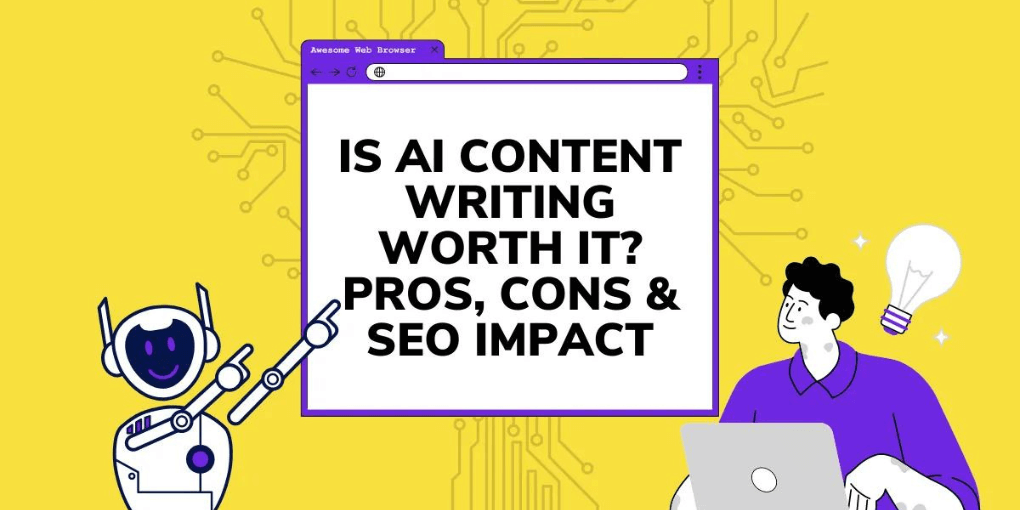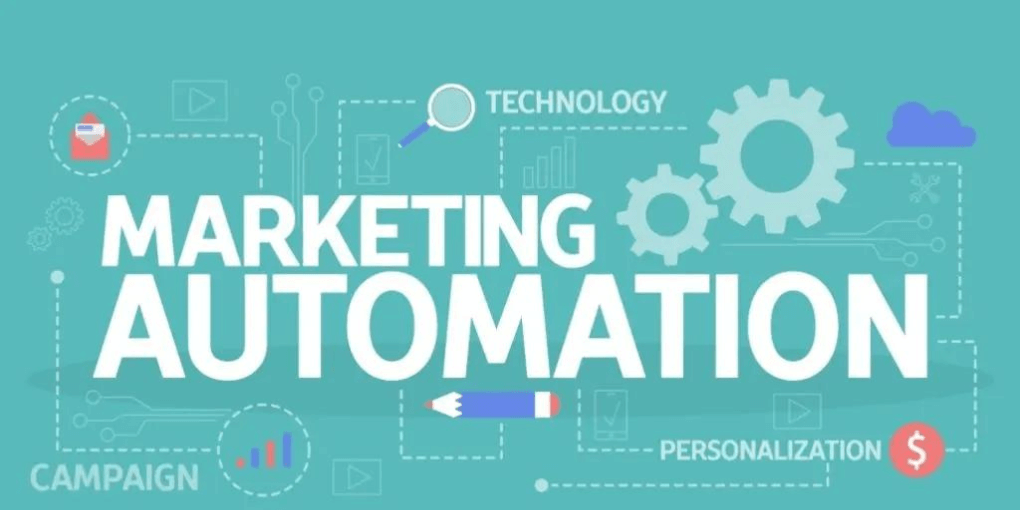Uncover the transformative potential of AI content writing, empowering businesses to create impactful and relevant content.
With businesses striving to establish a strong online presence, the role of content writing has become more crucial than ever before. However, keeping up with the demand can be challenging for human writers alone.

This is where Artificial Intelligence (AI) content writing comes into play. AI has the potential to revolutionize the content-writing industry by offering efficient and effective solutions.
In this article, we will explore the potential of AI content writing and how it can shape the future of the industry.
Benefits of Using AI for Content Creation: Time and Cost Efficiency
The use of AI for content creation offers several benefits, including time and cost efficiency, among others. Here’s an overview of how AI can be used to create content more efficiently and at a lower cost:
Faster Content Creation
AI algorithms use natural language processing (NLP) to analyze vast amounts of data to generate new content quickly and accurately.
This can speed up content creation processes significantly, enabling businesses to generate more content efficiently.
Reduced Labor Costs
AI algorithms can automate content tasks, reducing the number of employees required to work on content creation.
This automation can result in significant cost savings over time, as businesses can allocate resources to other critical areas.
Customization
AI algorithms can personalize content for individual users, which is a great benefit above human writers that lack the time and resources to individualize such efforts.
Improved Accuracy
AI algorithms are programmed to follow specific guidelines, which help to ensure accurate and consistent messaging across different pieces of content.
This helps to maintain content quality, coherence, and the consistency of brand voice.
Increased Output
With the ability to work non-stop, AI algorithms can produce content at a much faster rate than human writers.
This can help businesses to scale their output while maintaining quality content.
Optimization
AI algorithms can analyze data sets to identify trends in user engagement with content, making it easier for businesses to optimize their content to drive better audience engagement, such as those involved in social media marketing.
Challenges in AI Content Writing and How to Overcome Them

While AI-powered content creation has immense potential, there are some challenges that must be overcome to achieve optimal results.
Here are some of the challenges in AI content writing and steps businesses can take to overcome them:
A. Quality Control: The quality of AI-generated content is not always consistent, and it can be challenging to ensure the same standards despite a volume increase in content.
Humans still need to oversee and control AI-generated reports to ensure quality.
A. Solution: One solution for ensuring better quality control is to provide guidelines for AI-generated content.
Businesses can also use human editors or writers to review and edit AI-generated content to ensure that it is of the highest quality.
B. Tone and Voice: Creating a unique and engaging brand ‘tone’ can be a challenge for AI-generated content.
Getting AI to create a given human-like voice is a problem that can be difficult to resolve.
B. Solution: One solution for addressing this issue is by implementing a system of review and approval of AI outputs.
After the AI creates the output, human editors can evaluate the content and make necessary style or tone changes to align it with the brand.
C. Limited Creativity: Despite technological advancements in AI, AI-generated content often lacks creativity and innovation compared to human-written content.
C. Solution: The solution to this problem is to collaborate between AI-generated content and human creative talent.
AI algorithms could lay the groundwork, and human writers/artists could refine the final product.
Companies can incorporate both AI-generated and human-written content to balance creativity with standard messaging in this manner.
D. Complaints around plagiarism:
Since AI is so pattern-driven, it’s easy for AI-driven content to end up being very similar to content produced and published in the past, leading to accusations of copying and plagiarism.
D. Solution: The best way to avoid plagiarism with AI-generated content is to avoid direct copying.
There must be an update in the algorithm to eradicate copying or properly credit a source of ideas cited in the content generated.
Successfully Integrate AI Content Writing into Marketing Strategy
Artificial Intelligence content writing is evolving, and many businesses are still testing waters on how to use it into their marketing strategy.

Here are a few steps to help your business successfully integrate AI content writing into your marketing strategy:
- Identify the Scope of the AI Content Creation: What areas of your business can benefit from AI-powered content writing? Determine which tasks will be automated using AI to ensure that your content is high quality, relevant, and timely.
- Invest in High-Quality AI Content Creation Tools: Select a reliable and robust AI-powered content creation tool that can help automate content creation. Ensure that the system you choose is customizable and easy to use, making it easier for writers to begin integrating AI and develop content that aligns with the brand’s vision.
- Configure the AI-Powered Tool: Tune your new AI-powered tool to meet the needs of your specific business. Configure content automations, set guidelines for writers, and establish criteria for what types of communication can be fully automated. Fine-tune any available internal interfaces to ensure that creative staff can customize content tools to their specifications.
- Train Your Content Producers: Train employees who use AI-powered content creation tools. Ensure that the team trained in AI knows to use the tools to create custom content, understands the algorithm used in the AI system, and is familiar with quality control standards.
- Review and Approve Content: Quality control is a very important part of implying AI-powered content into the marketing strategy. It’s best practice to have writers oversee the AI to ensure fixes are completed correctly. Implement checks on the AI-generated content and monitor content distribution on both the brand’s website and social media platforms.
AI and SEO Content Writing
AI has become an indispensable tool for enhancing SEO content writing. AI algorithms can analyze vast amounts of data to generate high-quality, search engine-optimized content quickly and accurately. Here are some ways AI is used in SEO Content Writing:
Keyword Research
Algorithms can assist in identifying the optimal keywords for optimization in an article based on a specific parameter such as relevance, relevance strength, lifespan, and competition.
This can save a lot of time and provide greater accuracy compared to performing keyword-based analyses manually.
Content Creation
By using data analytics, AI algorithms can produce content based solely on relevant topics, images, and phrases.
AI-generated content can benefit writers with lots of content optimization to ensure keywords are optimally inserted for maximum productivity.
SEO Optimization
AI algorithms can also analyze and improve various elements of SEO, including website meta descriptions, title tags, internal links, and the structure of content.
This helps businesses to optimize the content and improve visibility in search engines.
In addition, AI algorithms can be used to optimize readability, providing suggestions for adjustments as required.
Personalization
By analyzing the unique needs of users, AI algorithms can develop content that matches visitors on the type of content that is needed, as they move through the funnel.
Personalized content enables visitors to make better-informed decisions and increases engagement with your product or service on the website.
Conclusion
The use of Artificial Intelligence offers limitless possibilities for improving the process of content creation and enhancing the effectiveness of marketing strategies.
From increased productivity and personalization to cost savings and improved optimization, AI-powered tools can revolutionize the way businesses go about their content creation and audience engagement.
Whether it is content creation or SEO optimization, businesses must embrace AI-powered technology in their strategies to remain competitive and achieve optimal results.
With a clear understanding of the benefits and limitations of AI-powered tools and the steps necessary to integrate them successfully into an existing process, businesses can make the most of these innovative technological solutions to achieve their goals and thrive in the digital age.

This blog post is written by AI Genie, Powered by ContentGeni’s cutting-edge AI technology. It is able to quickly and efficiently produce high-quality written content on a wide range of topics. While AI Genie may not have a physical body, it is constantly learning and evolving to provide the best possible content for its readers.